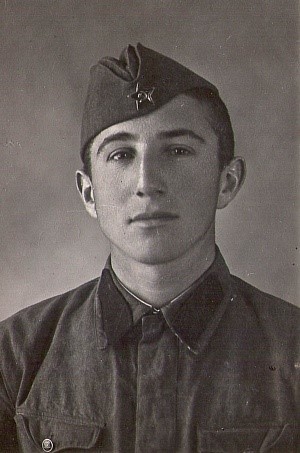Lev Gordimer was born in 1921 in the town of Genichesk, in the southern Ukraine. His father Itsyk-Vulf Gordimer was a native of the Lithuanian town of Šiauliai (at that time written according to the Polish spelling Szawle). From 1912 to 1915 the father worked as an apprentice pharmacist in Papilė (in northern Lithuania) and in 1916 settled in Genichesk, where he became the manager (or a deputy manager) of a pharmacy where Lev's mother also worked. Lev graduated from high school in Genichesk and in 1939 entered the Moscow Machine-Tool Institute (now Moscow State Technological University). After one month of study, Lev was drafted into the Red Army and then served in the Crimea. It was there that the artillerist Sergeant Gordimer learned of the beginning of the Soviet-German war in June 1941. He was immediately promoted to the rank of second lieutenant and sent to Stalingrad, then peaceful city remote from the frontlines. He was assigned to the 370th Artillery Regiment and sent to the Donbass, in Eastern Ukraine. In March 1942, he was seriously wounded but, after a long stay in a military hospital, he refused to be classified as an invalid and demanded to be sent to the front.
In November 1942, Gordimer was assigned to the 272nd Mortar Regiment – a support regiment for the motorized infantry that was part of the 3rd Tank Army. His unit helped the infantry during street fighting in urban areas. He fought in the battles for the recapture of Kharkov, in Eastern Ukraine, during which he was wounded in March 1943. Then he took part in the Oriol Operation in the summer of 1943 and the forcing of the Dnieper River between September and November 1943. For his participation in the latter operation, Gordimer was awarded two military orders – the Red Star in September and the Order of Alexander Nevsky (the award given for excellence as a commander) in November. In the latter month, particular, in November, seeking to thwart an enemy counter-offensive, Gordimer not only put his mortars into action, but also ordered his platoon to attack the enemy hand-to-hand. He led his soldiers into battle and was wounded in the head during the fighting.
After that injury, Gordimer was released from active service. He wanted to continue his technical education, but soon realized that he would not be able to work as an engineer since he could no longer hold a draftsman's pencil in his hand. Consequently, he decided to study law at Moscow University, from which he graduated in 1947. Gordimer settled in the Crimea, where he worked in the prosecutor's office and as a legal advisor for several administrative bodies. He retired in 1987.







